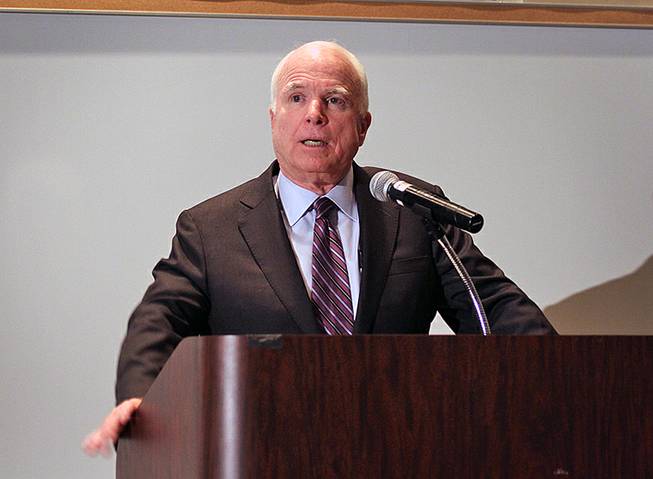
Sen. John McCain of Arizona addresses a crowd at the College of Southern Nevada on the impact of large cuts on defense spending. Because Democrats and Republicans could not reach a budget reduction agreement, automatic cuts are scheduled to take effect at the beginning of 2013.
Tuesday, Aug. 14, 2012 | 2 a.m.
Sun coverage
Three Republican senators are attempting to accomplish what a “supercommittee” of 12 legislators could not: bring both parties together for a budget compromise that would dodge mandatory cuts set to take effect in January.
After visiting Nellis Air Force Base, Sen. John McCain of Arizona, New Hampshire Sen. Kelly Ayotte and Sen. Lindsey Graham of South Carolina held a town hall meeting Monday at the College of Southern Nevada’s North Las Vegas campus to emphasize the “catastrophic” effects the cuts would have on U.S. defense.
“We are facing draconian cuts to our nation’s defense as of the first of January 2013,” McCain said. “Secretary of Defense Leon Panetta has stated unequivocally that it would devastate our nation’s defense ... if these cuts are allowed to take effect. I’m not sure how many Americans are aware of the dramatic impact that this would have, not only our equipment and training but also on the ability to retain men and women in the military who wish to continue to serve.”
The trio’s tour, “Preserving America’s Strength” — which already has visited Florida, North Carolina, Virginia and New Hampshire — is designed to sound the alarm on sequestration.
In 2011, a fight over raising the debt ceiling boiled over into a budget quagmire. Republicans wanted spending cuts before signing off on a $2.1 trillion increase of the cap on U.S. borrowing power. In the end, the debt ceiling was raised, but both parties agreed to form a Joint Select Committee on Deficit Reduction, the so-called supercommittee, tasked with reaching a consensus on how to reduce the federal budget.
Looming over the committee was sequestration, automatic widespread cuts that would trigger if the 12 lawmakers could not reach consensus. No deal was reached, and now $110 million in cuts spread over defense and domestic programs loom.
Veteran’s benefits, Medicaid and food stamps are exempt. President Barack Obama recently exempted military personnel, as well.
“What I’m here to do along with my colleagues is to urge both parties to deal with this is in a responsible manner. Congress has done some dumb things, and this is probably at the top of the list,” Graham said. “If you can't resolve the debt situation without destroying the military, you’ve really screwed up. ... (The supercommittee) failed.”
Graham said he and the two other GOP senators, who are all members on the Senate Armed Forces Committee, are suggesting a stay on sequestration for four months so the issue can be worked out after the November elections.
Both Sen. Dean Heller and Sen. Harry Reid were invited to the meeting, according to a tour release, but neither appeared.
“I’m disappointed my Republican colleagues who are in Nevada today have forgotten that their party helped to put sequestration in place and are now choosing to put millionaires ahead of the military,” Reid said in a statement released in response to the visit. “And I am disappointed my Republican colleagues have forgotten that it was their party’s refusal to adopt a balanced approach that closes corporate tax loopholes and asks the wealthiest to pay a little more that will cause these defense and domestic cuts to occur.”
After the three senators gave opening statements, they took questions and comments from the few dozen in attendance. At that point, the discussion focused more on the merits of defense spending in general than how to tackle sequestration.
Some supported the senators, who argued that such large reductions in military spending would harm the economy, weaken the U.S. position globally and, as Graham suggested, leave the country vulnerable to threats from China and Iran.
Graham said any budget-reduction plan must start with sharp reductions in entitlement programs, which was met with both jeers and cheers.
David DuVall, an Arizona resident who attended the event, called the senators’ travels a “tour of fear” and said the foreclosure rate and the winnowing of Medicaid and food stamp rolls were more pressing issues.


Join the Discussion:
Check this out for a full explanation of our conversion to the LiveFyre commenting system and instructions on how to sign up for an account.
Full comments policy